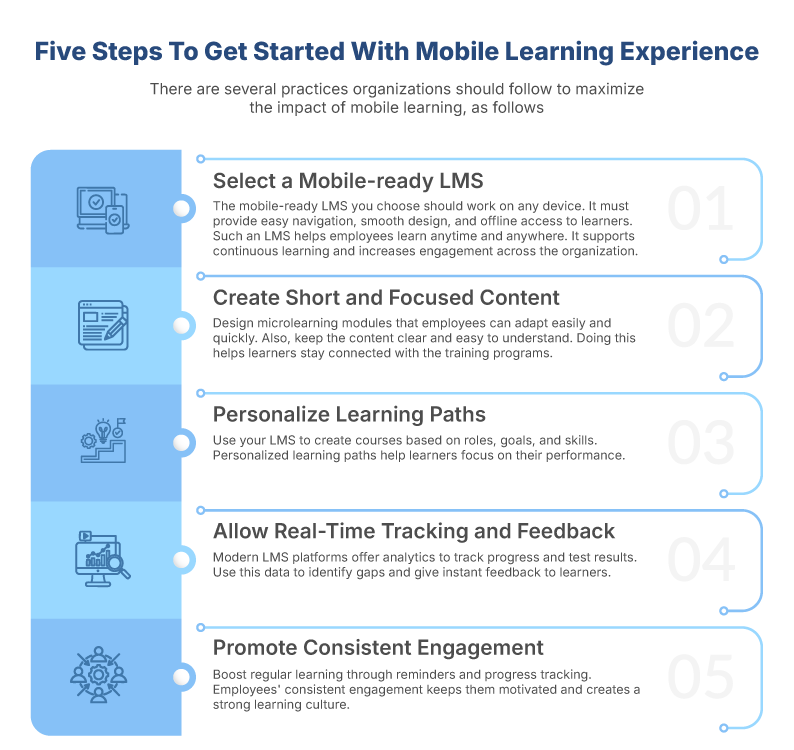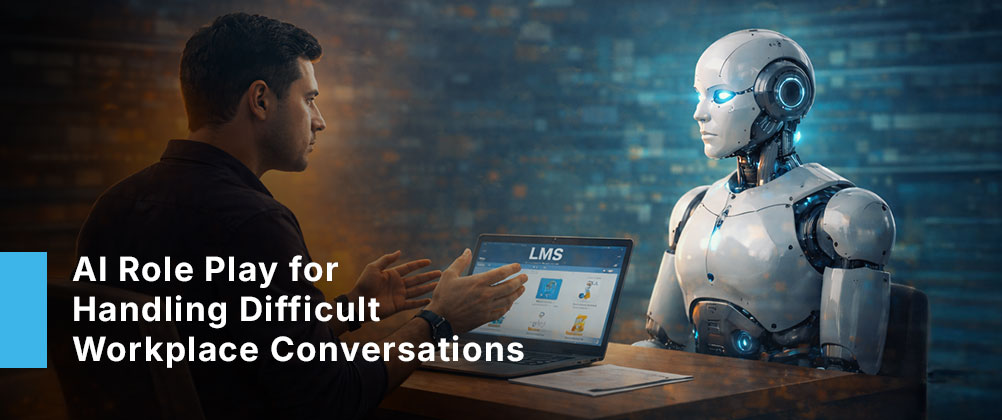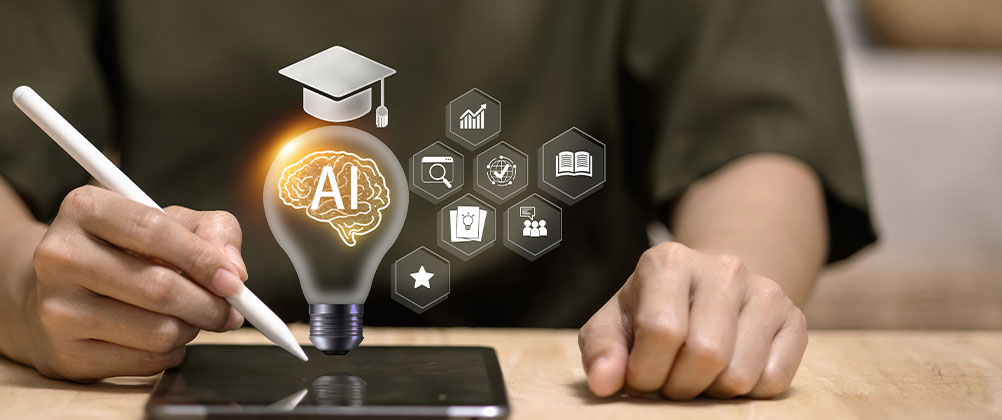How Mobile Learning Trends Are Unlocking Engagement with Modern LMS Technology

In today’s digital workplace, employees work remotely, in hybrid setups, or on the move. Training and development no longer fit within training rooms only. For this reason, mobile learning has become essential. It allows learners to access their training course at their convenience. The modern workforce demands dexterity and flexibility. So, mobile-first learning is now vital, not optional.
Modern learning management systems support this mobile-first approach. These platforms help organizations change how learning is delivered, consumed, and measured.
Mobile devices, strong connectivity, and advanced LMS features now work together. This combination makes a new phase in workplace learning transformation.
Let’s check why mobile learning matters and the key mobile learning trends for 2025.
Why Mobile Learning Matters?
The big shift towards mobile learning has changed the way we utilize and implement the knowledge in our workplace. About 83% of the people worldwide now have a smartphone. Also, the estimated time they spend daily on their mobile device is 3+ hours.
The rise of mobile learning indicates that employers can now offer more engaging and accessible content to their employees. Mobile learning platforms allow employees to access the content anytime, anywhere.
The benefits are huge, but several companies are still thinking about adopting this new learning approach. Here are some reasons to start implementing an LMS mobile app to increase engagement and knowledge retention.
Higher Flexibility
The flexibility of accessing the content anytime, anywhere removes barriers to learning and keeps training accessible. It helps people retain knowledge better and apply it when needed.
Mobile learning supports quick, on-the-job learning moments. It also builds a strong culture of continuous development. Mobile access fits how people live and work today. It makes learning more relevant and immediate.
On-the-go Learning
Learning through mobile devices helps companies fit training into the flow of work. Employees learn while working, not after tasks end.
This approach supports dispersed teams, frontline staff, and global organizations across time zones. As mobile use grows, companies must understand and apply key mobile learning trends. Doing so keeps their workforce skilled, connected, and ready for change.
Enables Real-time Content Delivery
Mobile learning increases real-time content delivery. Managers can update courses, share new resources, or launch quick refreshers instantly. This keeps learning current and aligned with business needs.
Real-time delivery ensures teams stay informed and act fast. It also supports consistent communication across departments and locations.
Time and Cost-efficient
Mobile learning makes training time and cost-efficient. Companies save on travel, venue, and printed materials. Short, focused modules reduce learning time while keeping productivity high.
Managers can update or reuse content easily, lowering development costs. It helps organizations train more people in less time with better results.
The Top Mobile Learning Trends
Mobile learning trends include personalized learning paths and gamification in LMS features that engage employees. Mobile learning allows organizations to track progress and results to analyze training effectiveness. These mobile learning trends showcase a big shift toward this flexible approach.
Microlearning
Microlearning offers short and intensive training programs. These modules help employees retain knowledge in less time. It is utilized by organizations to detect the gaps in skills and enhance performance.
Modern LMS platforms allow microlearning through mobile applications. The strategy of micro learning makes the training process easy, hassle-free, and efficient.
Gamification in Learning
Gamification in learning makes training more interactive and outcome-oriented. Gamification in LMS enhances employees’ engagement and brings them success.
It keeps employees motivated, and they find it easy to compete with other employees. In LMS, gamification enhances consistency and prolongs the productivity of employees.
AI-based Personalized Learning
AI helps build employee-specific learning strategies based on jobs, goals, and skill levels. The LMS tracks performance and recommends courses for each learner.
This narrow methodology helps to save time and enhance learning. The employees acquire applicable skills, and organizations receive insights based on data. Machine-based learning is more specific and measurable with AI-based recommendations.
Mobile-First Learning Experience
Mobile-first learning specifies that all training materials be available on smartphones and tablets. During breaks, travels, and fieldwork, employees can learn without interruptions.
Modern LMS platforms include smaller, user-friendly interfaces. Such a design makes it more accessible and learning convenient. With mobile-first strategies, organizations reach every learner—regardless of location or schedule.
Integration with Performance Analytics
Modern LMS platforms combine performance analytics with training data. Managers can track learners’ progress, completion, and results in real time.
These understandings allow them to adjust training programs and improve performance. Integration links learning to business performance measures. It proves that all learning programs boost employee productivity and growth.
How Modern LMS Platforms Enable Flexible Access
A modern LMS is like an innovative tool now. It’s a mobile-friendly ecosystem enabling access anytime, anywhere. Let’s see how modern LMS platforms support this shift
Native mobile app experience
A mobile learning platforms provide an intuitive mobile experience — the learning experience travels with the user. Offline mode provides access even when no or limited connectivity.
Easy and responsive interface
The modern LMS platform responds easily to different screen sizes. In this way, it makes the user experience consistent across different devices.
Personalized learning
With smart algorithms, the LMS apps suggest the next best learning activities based on the learner’s history, role, and skills gaps. It ensures relevance and reduces friction.
Push notifications and reminders
The mobile experience is proactive — reminding learners of upcoming tasks. It pushes learners towards quick course completion and keeps them engaged.
Tracking & analytics
Mobile data flows back into the LMS so administrators and L&D teams can measure mobile usage, progress, engagement, and outcomes — ensuring mobile learning isn’t just accessible, but also measurable.
Of course, modern LMS systems enable flexible access for learners and help organizations to deliver training that fits their training needs.
Top Benefits Skill Lake Offers With A Mobile-first Approach
- Anytime, Anywhere Learning: Skill Lake LMS offers anywhere, anytime learning convenience. It enables easy access to courses on any mobile device and provides offline support.
- Improved Engagement: Skill Lake comes with micro-learning modules and gamification features. This helps keep learners engaged and motivated.
- Hassle-free Training: Mobile access to courses reduces the need for trainers to travel to different training venues. This helps reduce logistics costs, simplifies onboarding, and enables continuous skill development without hassle.
- Better Skill Alignment & Performance Impact: Dedicated learning journeys help managers address skill gaps. Staff performance can be easily aligned with company goals.
- Efficient Content Management & Centralization: Our unified platform puts all content in one place. It reduces duplication, enabling consistent updates and simplifying administration.
- Measurable Outcomes: Mobile learning platforms enable detailed tracking. Course completion rate, progress, and competency mapping can be measured more realistically. This helps the L&D team get actionable insights to plan training better.
- Stronger Learning Culture: Allowing learners the convenience of mobility, you build habits of continuous development. This helps empower frontline teams faster and create a culture of agile learning.

Conclusion
Mobile learning platforms now play a key role in skill development and employee growth. It helps organizations stay competitive. Trends like microlearning, personalized paths, and immersive learning shape modern training. Employees can learn anytime and anywhere with ease.
Modern LMS platforms — especially those built with mobile in mind — are the enablers of this transformation. Skill Lake offers a full mobile-capable learning ecosystem that helps organizations not just deliver mobile learning, but deliver flexibility and scalability.
If your organization wants flexible learning access, start now. Mobile-first learning makes your workforce stronger and more skilled. It increases engagement, improves performance, and brings better outcomes. Request a free demo with Skill Lake today!
Build a culture of continuous learning with Skill Lake’s state-of-the-art people development platform. Give your employees professional training to help them excel in their job roles and propel your business to greater efficiency and success.
Start Today

Anoop Kumar MS
Anoop Kumar MS, Product Manager of Fingent Global Solutions Pvt. Ltd., is an experienced product specialist with expertise in identifying customer needs and delivering innovative, data-driven solutions. Skilled in wireframing, UX, requirements analysis, risk assessment, team management, and root cause analysis, he excels in managing product lifecycles and fostering seamless collaboration to address real-world challenges.